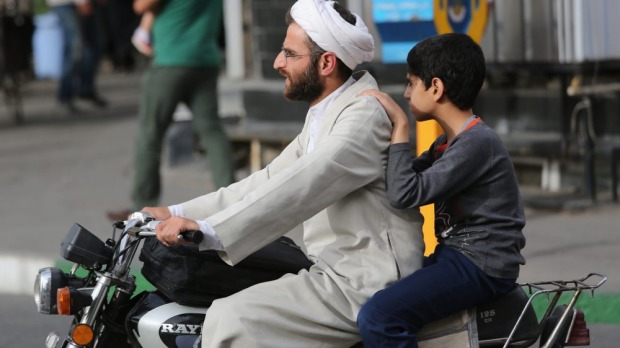IN THE MEDIA
Vigilance, not misplaced enthusiasm, needed in the wake of Iran deal implementation
January 22, 2016 | Colin Rubenstein

The Age – January 21, 2016
Colin Rubenstein
On January 15, the International Atomic Energy Agency determined that Iran had fulfilled the requirements under the nuclear understandings reached last year (also known as Joint Comprehensive Plan of Action, or JCPOA) necessary to begin implementation of the deal to delay its nuclear weapons program.
This announcement paves the way for the removal of sanctions worth hundreds of billions of dollars to Iran. Western companies, including many in Australia, are lining up to capitalise on business opportunities in the lucrative Iranian market.
However, while the IAEA’s report detailing Iran’s co-operation in the deal may appear encouraging, now is no time to celebrate. Grave risks lie ahead, not only for businesses and investors, but for world stability.
Given that the West has surrendered its greatest source of leverage on Iran while simultaneously supercharging Iran’s economy and approving the removal of the arms embargo on the country in five years and the ban on transferring ballistic missile technology in eight – Iran must be now treated with greater caution and scrutiny than ever.
It’s important to remember that the steps Iran has taken in order to have the sanctions removed do not represent the dismantling of Iran’s nuclear program but only a partial rollback of certain aspects of it and mothballing or disconnecting other enrichment hardware. This means that, moving forward, inspections, intelligence and strong enforcement will remain crucial to ensure that Iran doesn’t cheat its way to a nuclear arsenal.
Certainly, in the months since the JCPOA was agreed upon, there has been nothing in Iran’s behaviour to suggest that investigators will have an easy time carrying out their duties. On the contrary, Iran’s belligerence regarding both nuclear issues and other problematic elements of its foreign policy have only increased.
In October, Iran tested a nuclear-capable precision-guided ballistic missile, in open defiance of a UN ban.
Last month, the IAEA determined not only that Iran had been lying for years about its nuclear weapons development work, but that it was impossible to develop a complete picture of Iran’s nuclear weapons program because Iran had destroyed evidence and refused to answer its questions.
Iran’s proxy army Hezbollah, fighting on behalf of the Assad regime, has been involved in atrocities in the Syrian war. These atrocities include Hezbollah’s leading role in the siege of Madaya that has caused the death of dozens of civilians there in recent weeks, including children.
Iranian-backed Houthi rebels continue to wreak havoc in Yemen, with fighting that has spilled over into Saudi Arabia.
Nor has Iran shown any interest in calming tensions with the United States. Just in the past month, it provocatively fired rockets near a US aircraft carrier and then detained and humiliated 10 US Navy sailors that it claimed had strayed into Iranian waters.
The US reaction to such examples of misbehaviour has been to avoid confrontation with Iran. With the exception of the belated imposition of a small number of minor sanctions in the aftermath of Iran’s missile tests, US officials have sought to downplay Iran’s transgressions, if not ignore them entirely.
By dodging confrontation, the US may well be trying to protect the deal, but if the agreement emboldens and strengthens an unrepentant enemy, there will be major costs incurred by this strategy.
Today, there are people paying the price in Yemen and in Syria. Tomorrow, flush with cash from the removal of sanctions, the destabilising influences of state terror sponsor Iran and its proxies are certain to widen this circle. At the same time, traditional Western allies in the region are questioning the commitment of the US to rally to their defence in the case of Iranian-backed aggression.
All the while, Russia has stepped into the regional power vacuum and the so-called Islamic State is slaughtering civilians with impunity in the vast areas it controls.
The Middle East powder keg looks likely to become more rather than less volatile, but a full-blown conflagration is not inevitable. Hopes of a return to regional stability begin with a clear-headed risk assessment.
Even the strongest proponents of the nuclear agreement concede that it does no more than delay Iran becoming a nuclear threshold state, and that state will be far more powerful militarily and economically than it is now.
Precisely for that reason, we cannot afford to mortgage our future on the hope Iran will eventually moderate. Tomorrow’s security demands – and any hopes the nuclear deal will eventually lead to more than just postponement of a nuclear day of reckoning – require increased Western vigilance across the board today.
First and foremost this vigilance will require setting firm policies regarding the way the West responds to Iranian transgressions – nuclear or otherwise.
With Iranian misbehaviour in terms of promoting terrorism, destablising neighbouring governments, illegally constructing missiles, breaking arms embargoes to other rogue entities and severe human rights abuses showing every sign of not only continuing but being turbocharged by a regime economically strengthened, the lifting of nuclear sanctions should hardly be end of the matter. Sanctions relating to these other issues remain in place. If Iran continues down its current path, they may need to be significantly enhanced.
Real normalisation should wait until Iran can demonstrate that it can behave like a normal regime. Given both the inherent economic and political risks, vigilance and caution will better serve Australia’s national interests than prematurely upgrading political ties or overly encouraging Australian businesses to attempt to take advantage of supposedly lucrative economic opportunities in Iran.
Dr Colin Rubenstein is executive director of the Australia/Israel and Jewish Affairs Council. Previously, he taught Middle East politics at Monash University for many years.
Tags: International Security, Iran





